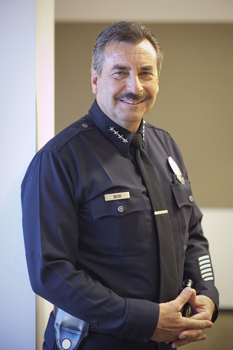
Los Angeles police chief Charlie Beck talks with the Daily News editorial team. (David Crane/Los Angeles Daily News)
With crime continuing to drop and no major scandals on his watch, Police Chief Charlie Beck celebrated his first year leading the Los Angeles Police Department on Wednesday with mostly positive reviews.
Beck was confirmed as the department's chief on Nov. 17, 2009, with big shoes to fill as he succeeded Chief Bill Bratton, who had won praise for lowering crime to record levels and skillfully navigating the city's tough political climate.
Crime has continued to drop under Beck, despite cuts to the department's budget and the weak economy. He has also managed to steer clear of getting mired in any major controversies so far, though he has been tested dealing with community protests, police shootings and a Lakers fan riot.
In a ceremony at the new Police Administration Building where Beck was surrounded by his command staff, Mayor Antonio Villaraigosa praised the chief for his willingness to embrace change and support constitutional policing.
"It's hard to believe that just one year ago, I made one of the most important announcements of my administration," Villaraigosa said. "I knew the right man to lead the LAPD was Charlie Beck.
"I think what distinguishes Charlie Beck is his whole life, all he wanted to be was a cop. He was boots on the ground. And, I think because of that, the men and women of this police department rallied around him."
LAPD figures show that Part 1 crime - the most serious, violent crimes - is down 7.1 percent, homicides are on pace to fall under 300 for the year - the lowest level since 1967 - and gang crime is down more than 11 percent.
"This is not the right climate for crime to go down," Beck said. "Nobody thought we could do this. People feel disenfranchised and we are seeing crime go up in major cities like Chicago and New York, where homicides are out of control.
"But we have the support of the city and we are willing to change. We are not a perfect department, but we try to do better every day."
The American Civil Liberties Union, which has a history of being at odds with the LAPD, said it was pleased with Beck's efforts in reaching out to different groups and supporting transparency at the LAPD.
"However, Chief Beck must still confront long-standing problems that all too often have disproportionately affected low-income communities and people of color," said ACLU legal director Hector Villegas.
"While LAPD has improved its investigations of racial profiling complaints, the department has yet to adopt an early warning system that would help identify those officers who still engage in consistent patterns of racial profiling and ensure they receive needed training."
Beck refuted a recent report that the Department of Justice was concerned the department was using a racial profile system in enforcing the law.
"Last year, we had 216 complaints on use of force," Beck said. "We had 195,000 people who were arrested. We had more than 550,000 citations issued. Out of 800,000 cases, only 216 complaints."
Beck has been tested in several incidents.
There was wide community protest over a shooting in early September in the MacArthur Park area. Officers said they were forced to shoot and kill Manuel Jamines, a 37-year-old construction worker from Guatemala.
Police said Jamines was drunk and had thrown a knife at him.
To deal with the situation, Beck called a community meeting that drew an audience of 200 people in which he promised a full investigation.
"What Charlie Beck does is reach out to people," Villaraigosa said. "He is not afraid to engage people and to collaborate with them."
Villaraigosa said Beck did the same thing in resolving a backlog of DNA rape kits, by meeting with critics to develop procedures to deal with issues.
Beck, who was promoted to deputy chief under Bratton, has embraced many of his principles - particularly with the Compstat program that charts crimes - but also brought a perspective of what ordinary cops experience, said Paul Weber, president of the Los Angeles Police Protective League.
"He has an institutional memory that Bratton didn't," Weber said. "When I would meet with Bratton, even as brilliant as he was, I would have to explain the history inside the LAPD. Charlie knows it."
"He grew up in the organization and he knows the cast of characters and the strengths and weaknesses of the organization."
As a result, Weber said officers are responding by giving more of their own time to cases, even with a contract in place that provides no pay increase.
"We have homicide detectives who are giving their own time to solve cases because they don't want it to go cold," Weber said. "It's amazing what people are doing to help solve crime."
Beck also has a much better relationship with City Council members than did Bratton - who was vocal in defense of his turf as police chief and was not shy in letting officials know he was in charge of the department.
"I think Charlie Beck has done all we asked him to do," said Councilman Bernard Parks, who was chief before Bratton and chairs the Budget and Finance Committee. "I have not seen him falter. What I appreciate is he is a steady hand. This whole issue of the budget, he understood what we were going through."
Councilman Dennis Zine, who serves on the Public Safety Committee and worked with Beck on the LAPD, gave him high marks.
"He is a cop," Zine said. "His heart and soul is with the people of Los Angeles. He has a son and daughter on the force and he is connected to the people."
Zine said he also sees differences from Bratton, with whom clashed.
"Charlie is not doing this for fame or fortune," Zine said. "He's doing it because he believes in being a cop."











